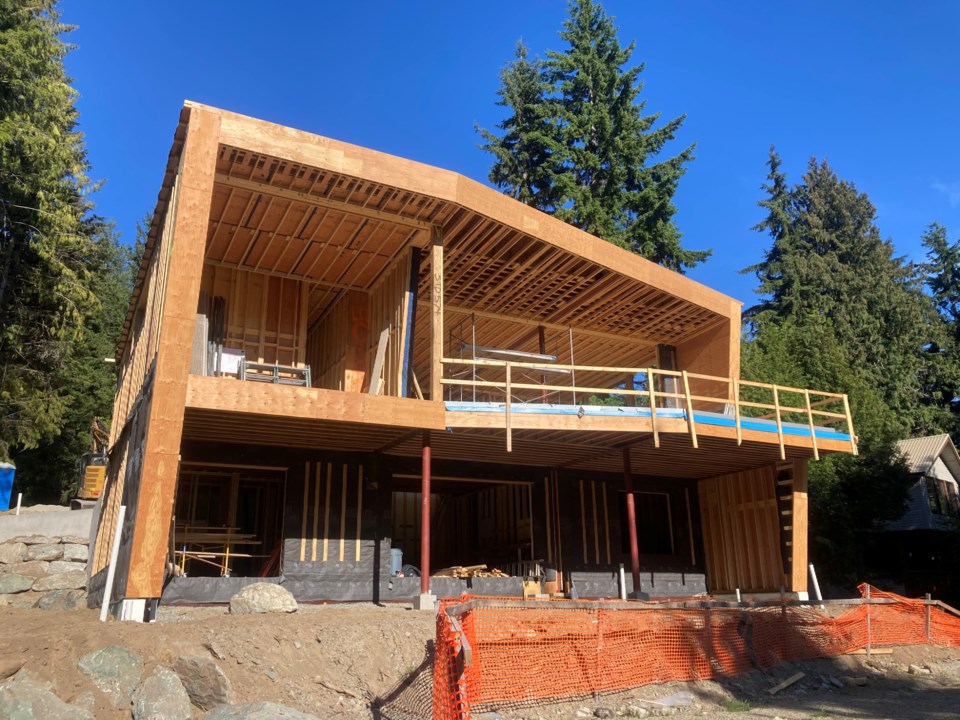Local builders are pushing back against the Resort Municipality of Whistler’s (RMOW) recent figures claiming wait times for residential permits have been significantly cut this year.
The RMOW said in a September report that wait times for commercial and multi-family residential building permits dropped by 50 per cent or more in the first eight months of the year, and more than 40 per cent for single-family residential permit applications.
After Pique reported the figures in an Oct. 2 article, the Sea to Sky chapter of the Canadian Home Builders Association (CHBA) sent a lengthy, 1,500-word letter in response, disputing the claims and laying out the persistent frustrations local builders have had with a permit application process it says is opaque and inefficient.
“We applaud the significant reduction in the time it takes to have permit applications reviewed, however this is not an indication of permit issuance times being reduced significantly,” the letter, sent by CHBA Sea to Sky president Tom McColm, read.
In its letter, the CHBA said as recently as this spring, members “experienced wait times of nine months for an initial review for a renovation.”
Axel Schreyer, president of Schreyer Construction, also told Pique he recently received a permit for a multi-family renovation that his company waited eight- and-a-half months for.
In a statement, the RMOW explained estimated wait times are based on a complete building permit application being received and either an initial review or deficiency list being sent to the applicant.
“Once [applications] are being tracked, they may also be held back by changes/ amendments or slow response time from the applicant, all elements that are not in the control of the RMOW building department,” the statement said. “With these considerations, there will be applications that take longer than the average approval time.”
The problem, according to builders, is the lack of clarity from the outset of the process around what information is actually needed from builders.
“I’m pretty good with permit applications, so we try to have it complete, according to their checklist,” said Schreyer. “But it often happens that after six months of wait time, they have additional questions and nobody has any idea what they could possibly be.”
Both Schreyer and the local CHBA chapter said it’s not unusual for the RMOW to request additional documents or information not on the initial checklist, “seemingly at the whim of whoever happens to be reviewing applications on a given day,” the CHBA letter read.
Compared to West Vancouver, the City’s estimated turnaround time for a multi-family renovation application, from initial review to issuance of a permit, is six to eight weeks, Schreyer said, adding the review takes place early on, so any issues with the application can be addressed at the beginning of the process.
In a recent Sea to Sky CHBA survey of primarily builders, 59 per cent of 29 respondents said they are “regularly” asked for additional, previously unrequired information and documentation in the permit application process. Four per cent said they “always” were. In the same poll, 53 per cent of 32 respondents polled said they “always” receive conflicting, inconsistent information from their local building and planning departments, with 19 per cent saying they “sometimes” did. (While the poll was corridor-wide, 94 per cent of respondents said they primarily deal with the RMOW, with the remainder primarily dealing with the Village of Pemberton.)
Compounding the problem, builders said, is the RMOW seems to frequently lose submitted documents, according to several complaints the CHBA has received. “This is, in the eyes of the industry (particularly structural engineers), evidence of poor management and organization,” read the minutes of a June Sea to Sky CHBA meeting attended by three RMOW department managers.
Unlike many other jurisdictions, the RMOW does not have an online portal for builders to submit permit applications, something the local CHBA chapter has been calling for since 2021.
“We’re told that simple, off-the-shelf, readily available online application systems (which most other jurisdictions have adopted) cannot work with the RMOW’s legacy systems,” the CHBA’s letter went on. “As a result, a rather lengthy process is being followed in an effort to adopt online applications. We’re told a custom-made solution is in the works. We look forward to the day this solution is operational.”
Lengthy permit turnaround times can affect builders, as well as the wider economy, Schreyer posited.
“Last year, interest rates went up like crazy and people are potentially jumping off jobs after waiting so long,” he said. “It’s a long time to keep a client patient. You can lose staff when you don’t know when a project is going to start and having to potentially lay people off. It does potentially affect the economy.”
Wait times and higher permit fees are also “pushing more work into the underground economy,” the CHBA said. “The most recent bump in permit fees seemed unjustified and was still implemented in the face of negative feedback provided about the increases.”
The Sea to Sky CHBA's industry survey is ongoing. Find it here.




